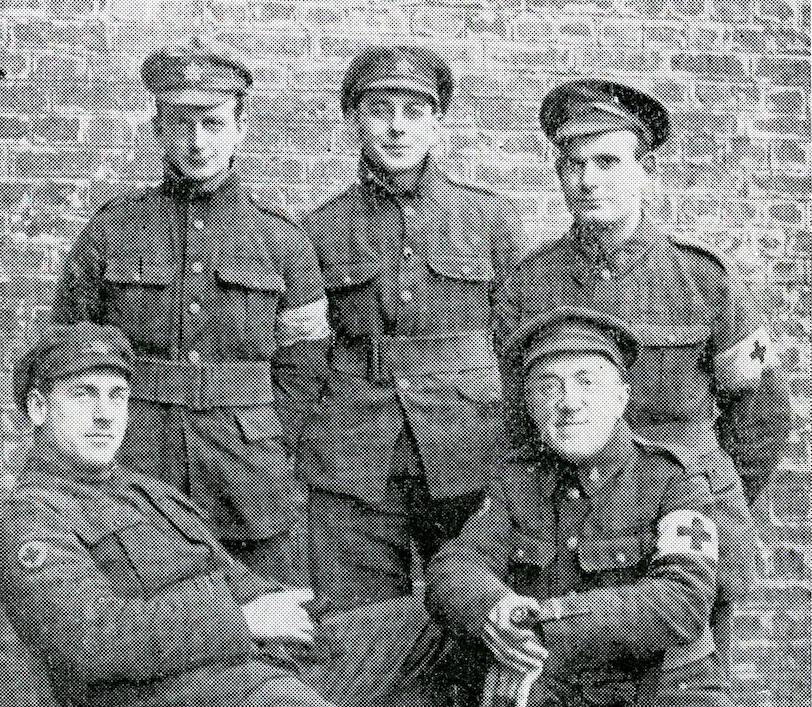
The men of the 11th Field Ambulance, University of Manitoba students.
Pomp under unusual circumstances
Mortar boards among the mortars on the First World War battlefield
Following their harrowing experience at Vimy Ridge in 1917, many Canadian soldiers were exhausted, shell-shocked, and terribly homesick. Some sought a semblance or normalcy in their lives, and in some cases this would have been through their studies at Canadian schools and colleges.
A typical university graduation ceremony features hundreds of graduands in their institution’s gowns and hoods, with tasseled mortar boards on their heads. Valedictorians offer words of encouragement and advice to students going outward into the world.
But if you were already “into the world,” in a strange and hostile landscape, facing death and destruction at every turn, how would a graduation ceremony hold meaning?
In 1917, soldiers who left their studies at St. John’s College in Winnipeg, Manitoba, and who had completed their courses, were eligible to be granted their degrees in absentia from Canadian universities. But some of their comrades decided to “reproduce in France the solemn ceremonies that were being carried out in Western Canada.”
“It was a creative way of keeping morale up, especially considering what circumstances these people were dealing with constantly”
The mock convocation was held in their camp, with degrees “conferred” upon five University of Manitoba students who were members of the Eleventh Canadian Field Ambulance. The men had left Winnipeg exactly one year earlier, and would have been graduating at home had they not been called up for duty. These included: Albert Roland Hall (BA/1917), John Gordon Andison (BA/1917, MA/1920), John Edward Cooper (BA/1917, BD/1923), Herbert James Tomkins (BA/1917), and George Gordon Grigg (BA/1917).
The “Convocation at the Front” was described by St. John’s College alumnus Albert Roland Hall in the college magazine in August 1918. It came from a wartime diary discovered by Raymond Currie, dean emeritus of arts, while researching his father’s military career.
“It was a creative way of keeping morale up, especially considering what circumstances these people were dealing with constantly,” said Currie. “Education was important to them and their education was so terribly interrupted. I think it is quite poignant.”
On May 14, 1917, not far from the battlefield and “well within the sound of the guns,” the author of the diary recorded a “side-splitting procession of soldiers marching round the camp, camouflaged in scholars’ gowns and hoods manufactured out of everything from a sandbag to a canvas waterbucket.”
The ersatz formal event included speeches, of course. “The opening address by the Chancellor, Dr. Fletcher, delivered in the finest Latin, though Greek to most, will not soon be forgotten,” the diary reads. “The speech of the monocled Minister of Education, the right Hon. Howard Winkler, BSA, was an excellent example of what a public servant can do in the line of manipulating the truth when he really tries.”
“a side-splitting procession of soldiers marching round the camp, camouflaged in scholars’ gowns and hoods manufactured out of everything from a sandbag to a canvas waterbucket”
The diary went on to note: “The granting of the honorary degrees (fictitious in this instance) afforded an evening’s entertainment in itself. Dr. Hyslop in presenting Albertus Edwardus Johnson very humourously indicated that gentleman’s worthiness to receive the degree of LLD (Dispenser of Light Literature). The regretted absence of Nobbus Clark Esq., necessitated the holding over of his degree of MSO (Master of Steak and Onions). It is believed that the gentleman was too busy cooking them to attend.”
Alas, the war could not be forgotten for long. The diarist described that following the festivities:
“’Old Fritz’ did not fail to greet us almost nightly by way of the air. The proximity of the Villers aerodrome, to where the hun used to follow our returning bombers, made for unpleasant interruption in the dreams of Chateau sleepers. Picture the scene: a Nissen hut, the floor of which is covered with sleeping soldiers rolled in blankets. Soon every man is awake from the horrid, rhythmic droning of a boche-bombing plane… Every man is awake with the noise and, make no mistake, quite fearful.”
The article about the Convocation at the Front is on the Archives & Special Collections website.






